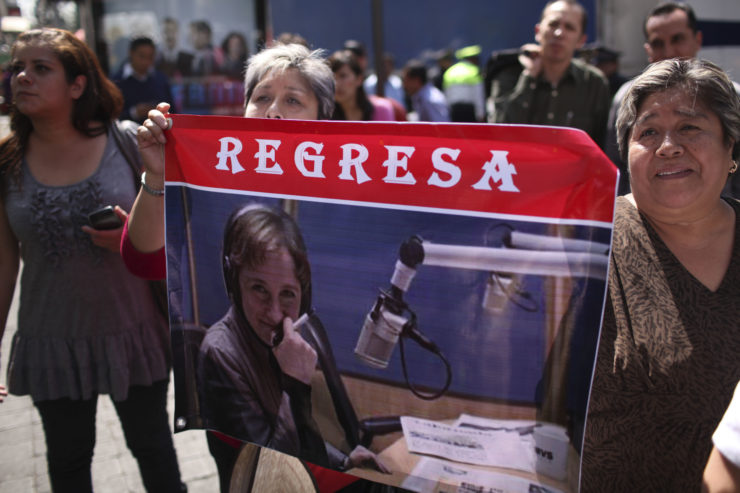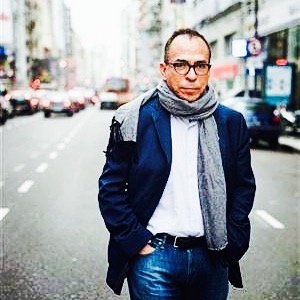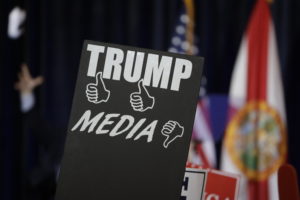
Protesters, outside the MVS radio station headquarters in Mexico City in February 2011, hold a sign that reads “Come back” and depicts Mexican journalist Carmen Aristegui, who said she was fired from the station for refusing to apologize for addressing a congressman's allegation that Mexico's President Felipe Calderon is an alcoholic
I’ve seen this bad movie before—in fact, far too many times: strongmen, whether vicious kingpins or populist leaders bullying reporters in either my native Mexico or across Latin America, authorities threatening reporters by cutting off state advertising money, muzzling them over fears of libel suits, or worse, reporters paying the ultimate price, with their lives.
Now I’m back in my adopted homeland, the United States, living the once unimaginable dream, often with huevos rancheros on my face. Yet, I used to sit across from some of my scared, scarred Mexican colleagues, who in the midst of their despair following the latest death threat, needed to hear something positive, hopeful. I’d talk to them about the United States as a role model. A beacon of freedom of the press, something to aspire to. Since the election of Donald J. Trump and his disdain for the media, some colleagues joke about egg on my face and tell me bluntly: We’re having second thoughts about your country and its press freedoms. I am, too.
It’s one thing for the U.S. media to be challenged by collapsing budgets, reduced newsrooms, and increased government secrecy. But to feel the full wrath of an incoming populist, nativist leader, Trump, is another. He’s already threatened to sue anytime press coverage is less than favorable and calls us losers, scum.
In one of many Trump campaign stops in Phoenix, Arizona, I found myself and colleagues on a press platform, smack in the middle of a hall with catcalls from irate supporters, insults, anger rising. Whenever there was a lull in the stump speech, Trump would retreat to two crowd-pleasing lines, generating frenzy in the room, the crowd rising, roaring (“Build that wall, Build that wall”) and calling us liars to wild applause, boos, and expletives. The platform at times felt like we were in the middle of a coliseum in Roman times, fresh meat, about to be tossed to starving lions, or worse, beheaded.
Of course, whatever uncertainty confronts us these days pales in comparison to what colleagues in Mexico and in other parts of the world face. The U.S. has a long history of press freedom, underscored by the nation’s First Amendment, strong institutions, and journalistic milestones from the Pentagon Papers to Watergate. Not so in Mexico and Latin America, where wobbly institutions, lack of convictions, make Mexico and the region among the most dangerous anywhere to practice journalism.
Over the years I’ve witnessed regions in Mexico fall silent, living under the shadow of lawless criminals and corrupt authoritarian governments. I’ve sat across brave journalists who risk their lives by crossing international borders to share information with U.S. journalists like me, away from the prying eyes of their spies, the so-called Halcones. The journalists take such risks to make sure stories get out so the public is informed enough to make decisions about what is happening in their communities. Yes, too often kingpins will take over social media and spread fear via stories that aren’t true. They spread fake news to control the narrative.
I’ve also been around colleagues too afraid to answer their cell phones because whoever is calling, usually cartel henchmen with nicknames from rooster to la Tortuga (turtle), may threaten you on the spot, almost like serving you with a death notice.
Indeed, the differences between the U.S. press and its neighbors are vast.
But when 18 journalism associations penned a rare open letter to Trump, who’s frequently threatened the media with attacks and lawsuits, it tells us that these are anything but normal times. The associations—including the American Society for News Editors, the National Press Club, and the Committee to Protect Journalists—urged Trump to uphold important traditions like a full press pool and regular press conferences.
What I’ve learned in Mexico is a renewed passion for accountability journalism and uncommon courage to tell stories in uncertain times. I take solace from so many investigative journalists in Mexico, colleagues such as Carmen Aristegui and her investigative team, thriving despite mounting libel lawsuits; Alejandra Xanic, who risks everything to hold the powerful, from governors to Walmart, accountable, and Marcela Turati, a current Nieman Fellow, to give others a voice, put a human face on numbers so that the dead are never forgotten.
Perhaps my most valuable lesson from Mexico is to believe, against all odds, in the power of story, the unmitigated truth, because truth still matters. Truth is our best defense. Truth is our most important protection. Truth is our best weapon.



